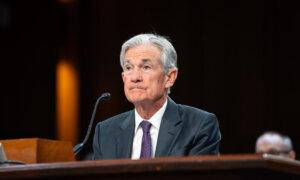Federal Reserve Bank of Atlanta President Raphael Bostic warns of economic uncertainty and labor market cooling in latest quarterly message.
Federal Reserve Bank of Atlanta President Raphael Bostic emphasized widespread economic uncertainty and signs of labor market softening in his latest quarterly message, urging a cautious approach to monetary policy while still noting the economy is “broadly healthy.”
Speaking in a video address accompanying his essay, Bostic noted that the Federal Open Market Committee (FOMC) decided in January to keep its benchmark interest rate steady at a range of 4.25 to 4.5 percent after reducing it by a full percentage point over the last three meetings of 2024.
This, he said, has led inflation to come down considerably as the labor market remains strong, though he warned that uncertainty has “broadened,” requiring a “cautious wait and see posture” in policymaking.
Bostic’s essay noted that while employment remains solid, signs of slowing are apparent. Payroll growth has remained robust, averaging 237,000 jobs per month over the three months leading to January.
However, he pointed out that job-finding probabilities have declined, the unemployment rate has ticked up to 4 percent, and workers are less likely to quit their jobs in search of new opportunities.
A Federal Reserve Bank of Kansas City measure of labor market conditions suggests the labor market now resembles 2017, a period of slower job growth compared to the tightening of monetary policy in 2022 and 2023.
Additionally, three sectors—health care and social assistance, leisure and hospitality, and government—accounted for about three-quarters of job growth in the past year, a shift from pre-pandemic trends.
“While the labor market is broadly stable, my staff and I are monitoring potential vulnerabilities,” he wrote.
Inflation remains a focus for the Fed, with recent data showing a bumpy path toward the central bank’s 2 percent target, he said. While core inflation has not meaningfully declined since last summer, Bostic noted that longer-term inflation expectations remain in line with pre-pandemic levels.
A key driver of persistent inflation has been housing costs, which official measures have yet to fully reflect. Bostic expects these pressures to ease as rental price trends from market sources such as Zillow and Redfin make their way into government inflation calculations.
Despite concerns, he does not see evidence of a surge in economic activity that could reignite inflation. “Inflation expectations have remained quite stable and relatively in line with pre-pandemic norms,” he said.
Bostic emphasized that “uncertainty is pervasive in early 2025” and affects both inflation and labor market trends. The global economic policy uncertainty index reached levels in December 2024 not seen since the early pandemic, while a trade policy uncertainty index has also spiked. Businesses are expressing concerns over potential tariffs and immigration policy shifts that could affect labor markets and pricing.
“These crosscurrents inject still more complexity into policymaking,” he wrote, adding that some firms are taking preemptive measures such as adjusting supply chains or stockpiling inventory in anticipation of possible trade disruptions.
Bostic cautioned that the favorable dynamics that helped curb inflation without triggering widespread job losses may not persist. The Fed’s approach, he said, will rely on incoming data, survey insights, and feedback from business contacts to navigate the evolving landscape.
“Today’s pervasive ambiguity calls for caution and humility as we continue working to bring about price stability and maximum employment for the American people,” he concluded.







